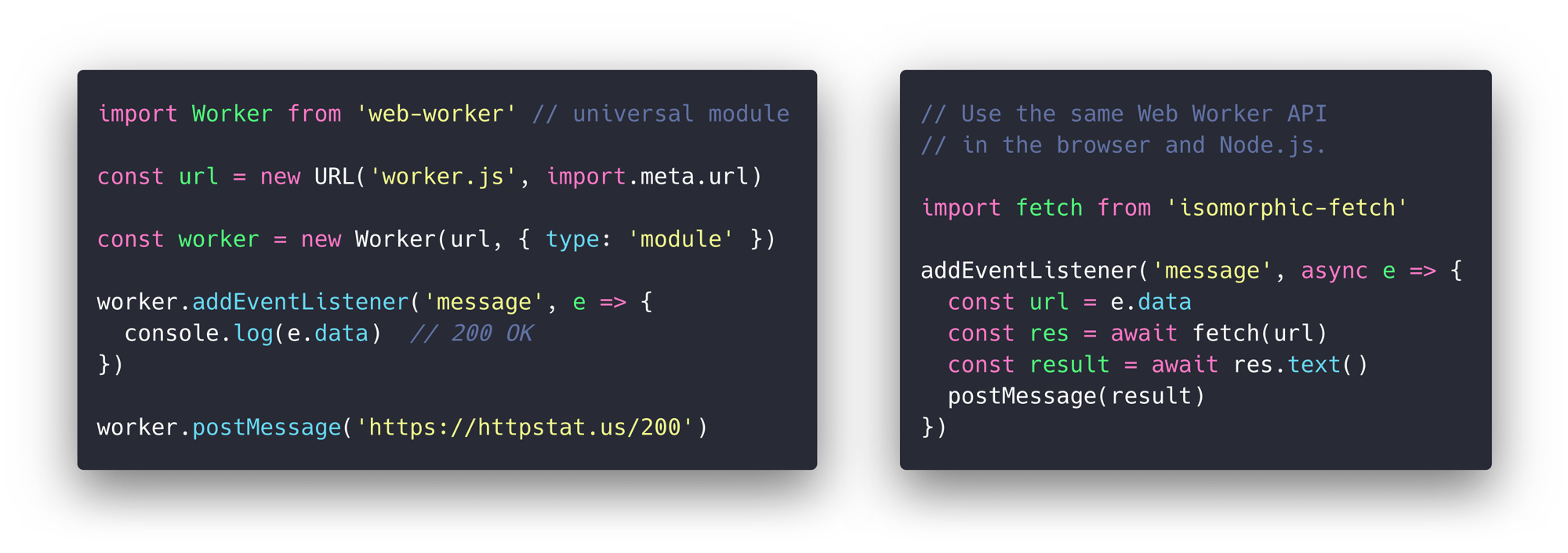web-worker
Consistent Web Workers in browser and Node.
README
web-worker

Native cross-platform Web Workers. Works in published npm modules.

In Node, it's a web-compatible Worker implementation atop Node's worker_threads.
In the browser (and when bundled for the browser), it's simply an alias of Worker.
Features
_Here's how this is different from worker_threads:_
- makes Worker code compatible across browser and Node
- supports Module Workers ({type:'module'}) natively in Node 12.8+
- uses DOM-style events (Event.data, Event.type, etc)
- supports event handler properties (worker.onmessage=..)
- Worker() accepts a module URL, Blob URL or Data URL
- emulates browser-style [WorkerGlobalScope] within the worker
Usage Example
In its simplest form:
- ```js
- import Worker from 'web-worker';
- const worker = new Worker('data:,postMessage("hello")');
- worker.onmessage = e => console.log(e.data); // "hello"
- ```
| main.js | worker.js |
|---|---|
|
|
👉 Notice how new URL('./worker.js', import.meta.url) is used above to load the worker relative to the current module instead of the application base URL. Without this, Worker URLs are relative to a document's URL, which in Node.js is interpreted to be process.cwd().
_Support for this pattern in build tools and test frameworks is still limited. We are working on growing this._
Module Workers
Module Workers are supported in Node 12.8+ using this plugin, leveraging Node's native ES Modules support.
In the browser, they can be used natively in Chrome 80+, or in all browsers via [worker-plugin] or [rollup-plugin-off-main-thread]. As with classic workers, there is no difference in usage between Node and the browser:
- ```js
- import Worker from 'web-worker';
- const worker = new Worker(
- new URL('./worker.mjs', import.meta.url),
- { type: 'module' }
- );
- worker.addEventListener('message', e => {
- console.log(e.data) // "200 OK"
- });
- worker.postMessage('https://httpstat.us/200');
- ```
- ```js
- import fetch from 'isomorphic-fetch';
- addEventListener('message', async e => {
- const url = e.data;
- const res = await fetch(url)
- const text = await res.text();
- postMessage(text);
- });
- ```
Data URLs
Instantiating Worker using a Data URL is supported in both module and classic workers:
- ```js
- import Worker from 'web-worker';
- const worker = new Worker(`data:application/javascript,postMessage(42)`);
- worker.addEventListener('message', e => {
- console.log(e.data) // 42
- });
- ```
Special Thanks
This module aims to provide a simple and forgettable piece of infrastructure,
and as such it needed an obvious and descriptive name.
@calvinmetcalf, who you may recognize as the author of Lie and other fine modules, gratiously offered up the name from hisweb-worker package.
Thanks Calvin!
[worker-plugin]: https://github.com/googlechromelabs/worker-plugin
[rollup-plugin-off-main-thread]: https://github.com/surma/rollup-plugin-off-main-thread
[WorkerGlobalScope]: https://developer.mozilla.org/en-US/docs/Web/API/WorkerGlobalScope
 探客时代
探客时代

